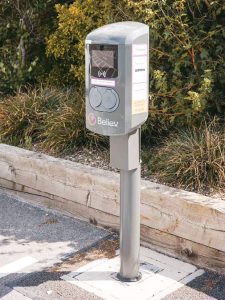 Daniel Lessiter, Head of Business Partnerships at charge point operator Believ, explains how an EV charging infrastructure plays a key role in supporting sustainable transport initiatives
Daniel Lessiter, Head of Business Partnerships at charge point operator Believ, explains how an EV charging infrastructure plays a key role in supporting sustainable transport initiatives
Access to Electric Vehicle (EV) charging infrastructure is of increasing importance in helping organisations enable employees, customers and stakeholders reduce their environmental impact by switching to EVs.
Indeed, investing in EV charging infrastructure is an effective way to offset Scope 3 emissions. While Scopes 1 and 2 refer to emissions owned or controlled by a company through purchasing or dispensing energy, Scope 3 emissions refer to business activity and the indirect consequences that it, or its associated value chain, has on the environment. EV infrastructure and facilitating the use of more sustainable modes of transport can significantly reduce emissions relating to business travel, employee commutes, visitor transportation and distribution of business goods and services.
With the government stating: “Transport is one of the most important sectors for achieving net zero by 2050, and so we must accelerate our efforts to decarbonise how people get from A to B…”*, the time is now to ensure that EV charging infrastructure is a vital element of a building’s sustainability credentials.
INDUSTRY INSIGHT
At Believ, we recently commissioned a major piece of industry research to uncover the preparedness of business owners (including FMs) to deliver EV infrastructure, and what specific challenges they were looking to resolve. The results were an encouraging sign that the intention is there, with all businesses surveyed having plans to install EV charging infrastructure in some size, shape or form. Almost nine out of 10 (88 per cent) had already started installing or had equipment in place, and most are planning to double their charge point numbers by 2028.
However, the report also uncovered several barriers to progress, and found that logistical and regulatory challenges are getting in the way. Some 70 per cent of businesses said that accessing the power grid was a frustration, 70 per cent struggle with inconsistent planning laws, and 74 per cent need specialist help to assess power needs and navigate regulations.
 A significant 74 per cent are concerned about installation costs, and one in five (20 per cent) worry about return on investment (ROI). Perhaps unsurprisingly, three quarters (75 per cent) said they want to generate money from charge points to offset installation costs, but more than two thirds (67 per cent) said they lacked the experience to calculate ROI.
A significant 74 per cent are concerned about installation costs, and one in five (20 per cent) worry about return on investment (ROI). Perhaps unsurprisingly, three quarters (75 per cent) said they want to generate money from charge points to offset installation costs, but more than two thirds (67 per cent) said they lacked the experience to calculate ROI.
CHARGE POINT OPERATORS
The challenges conveyed in the research are entirely understandable in what is a new, varied and complex landscape. There is the need to better understand EV charging technology, specific planning laws and regulations, power capacities and grid access. Overcoming these challenges, and ultimately helping to reduce emissions in support of ESG policies, can and is being achieved through engaging the private industry.
The first port of call for experienced Charge Point Operators (CPOs) is in designing tailored solutions to suit businesses’ needs. The number, speed and location of charge points will depend on stakeholder numbers and user journeys, and getting the right hardware in the right location is vital to ensuring facilities are as convenient and (where desired) as well used as possible.
The process of overcoming logistical and regulatory EV charging installation challenges should naturally fall to private organisations that navigate these challenges every day. Streamlining the process for FM managers and businesses will speed up the public EV charging infrastructure rollout – and ultimately support the decarbonisation of transport.
FULLY FUNDED SOLUTION
CPOs offer a fully funded solution that entirely removes the funding challenge from businesses. This not only means that a business does not have to invest capital upfront, but also that it can rely on its CPO partner to predict and report on ROI, and to help FMs create and secure a business case that is based on a bespoke host-remuneration package.
The fully funded model inherently breeds an ‘always on’ charging service that organisations will rely on as more and more of their stakeholders move to electric transport. As the CPO only earns its investment back if the charging infrastructure is being used – it is vital that it is well maintained to ensure maximum reliability. It is for this reason that Believ’s solution includes maintenance as standard, and why it has a hardware uptime of more than 99 per cent.
Ultimately, organisations require an end-to-end solution that supports the entire lifecycle of their EV infrastructure journey. The solution should remove the hassle of planning and securing board-level buy-in, ease the installation process, and ensure a programme is in place for the equipment to be regularly serviced and maintained.
It’s important that an EV charging infrastructure solution supports ESG priorities, but its value will be felt far wider than those responsible for driving ESG policy. In the not-too-distant future, all businesses’ stakeholders will rely on EV charging as they join the more than one million EV vehicle drivers in the UK today. And, by facilitating the electric switch, we will help the UK decarbonise transport.




